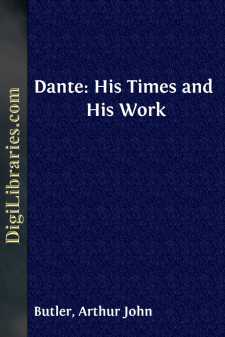Categories
- Antiques & Collectibles 13
- Architecture 36
- Art 48
- Bibles 22
- Biography & Autobiography 813
- Body, Mind & Spirit 142
- Business & Economics 28
- Children's Books 14
- Children's Fiction 11
- Computers 4
- Cooking 94
- Crafts & Hobbies 4
- Drama 346
- Education 46
- Family & Relationships 57
- Fiction 11829
- Games 19
- Gardening 17
- Health & Fitness 34
- History 1377
- House & Home 1
- Humor 147
- Juvenile Fiction 1873
- Juvenile Nonfiction 202
- Language Arts & Disciplines 88
- Law 16
- Literary Collections 686
- Literary Criticism 179
- Mathematics 13
- Medical 41
- Music 40
- Nature 179
- Non-Classifiable 1768
- Performing Arts 7
- Periodicals 1453
- Philosophy 64
- Photography 2
- Poetry 896
- Political Science 203
- Psychology 42
- Reference 154
- Religion 513
- Science 126
- Self-Help 84
- Social Science 81
- Sports & Recreation 34
- Study Aids 3
- Technology & Engineering 59
- Transportation 23
- Travel 463
- True Crime 29
Dante: His Times and His Work
Categories:
Description:
Excerpt
PREFACE
This little book is mainly compounded of papers which appeared, part in the Monthly Packet, and part in the Magazine of the Home Reading Union. It will be seen, therefore, that it is not intended for those whom Italians call “Dantists,” but for students at an early stage of their studies. To the former class there will be nothing in the book that is not already familiar—except where they happen to find mistakes, from which, in so extensive a field for blundering as Dante affords, I cannot hope to have kept it free. In the domain of history alone fresh facts are constantly rewarding the indefatigable research of German and Italian scholars—a research of which only the most highly specialised specialist can possibly keep abreast. Even since the following pages were for the most part in print, we have had Professor Villari’s Two Centuries of Florentine History, correcting in many particulars the chroniclers on whom the Dante student has been wont to rely. This book should most emphatically be added to those named in the appendix as essential to the study of our author.
In connection with some of the remarks in the opening chapter, Professor Butcher’s Essay on The Dawn of Romanticism in Greek Poetry should be noticed. I do not think that the accomplished author’s view is incompatible with mine; though I admit that I had not taken much account of the Greek writers whom we call “post-classical.” But it is to be noted, as bearing on the question raised in the second footnote on , that most or all of the writers whom he cites were either Asiatics or nearly touched by Asiatic influences.
I have made some attempt to deal in a concise way with two subjects which have not, I think, hitherto been handled in English books on Dante, other than translations. One of these is the development of the Guelf and Ghibeline struggle from a rivalry between two German houses to a partisan warfare which rent Italy for generations. I am quite aware that I have merely touched the surface of the subject, which seems to me to contain in it the essence of all political philosophy, with special features such as could only exist in a country which, like Italy, had, after giving the law to the civilised world, been unable to consolidate itself into a nation like the other nations of Europe. I have, I find, even omitted to notice what seem to have been the ruling aims of at any rate the honest partisans on either side: unity, that of the Ghibelines; independence, that of the Guelfs. Nor have I drawn attention to a remarkable trait in Dante’s own character, which, so far as I know, has never been discussed—I mean his apparent disregard of the “lower classes.” Except for one or two similes drawn from the “villano” and his habits, and one or two contemptuous allusions to “Monna Berta e Ser Martino” and their like, it would seem as if for him the world consisted of what now would be called “the upper ten thousand.” In an ordinary politician or partisan, or even in a mere man of letters this would not be strange; but when we reflect that Dante was a man who went deeply into social and religious questions, that he was born less than forty years after the death of St. Francis, and was at least closely enough associated with Franciscans for legend to make him a member of the order, and that most of the so-called heretical sects of the time—Paterines, Cathari, Poor Men—started really more from social than from religious discontent, it is certainly surprising that his interest in the “dim, common populations” should have been so slight.
The other object at which I have aimed is the introduction of English students to the theories which seem to have taken possession of the most eminent Continental Dante scholars, and of which some certainly seem to be quite as much opposed to common sense and knowledge of human nature as the conjectures of Troya and Balbo, for instance, were to sound historical criticism....


